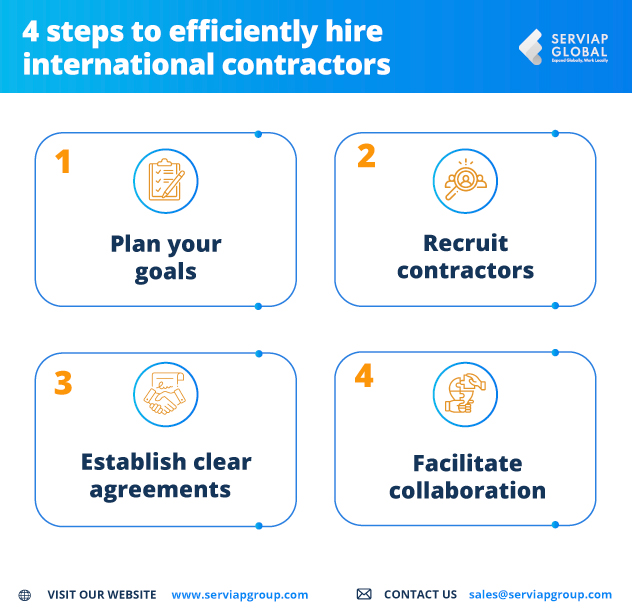Table of Contents
An international contractor (IC), also known as a global or independent contractor, is a person or organization that works for companies based in another country. While expanding a business, hiring independent contractors abroad offers many benefits, such as helping you easily navigate local labor regulations.
However there are also some risks involved in hiring independent contractors abroad, including the possibility of misclassifying them when their working conditions mean they should be registered as employees. Contractor misclassification can result in legal complications and financial penalties.
SEE ALSO: Call center outsourcing: 5 great destinations to consider
If you are interested in hiring independent contractors abroad, contact us to find out more about how we can assist you.
What defines an international contractor?
When hiring independent contractors abroad, you may find them called an independent contractor, freelancer or consultant. Whatever name is used, they are self-employed people who operate independently according to an established contract.
They may seem to be employees, but unlike a worker who performs for one employer, contractors run their own business. Different organizations hire them to work on specific projects, whether short-, medium- or long-term. While compensated for their services, technically, a contractor is not on the payroll. They also may work for several employers at the same time.
When a company is hiring a contractor abroad, this autonomous service provider is known as a global or international contractor (IC).
This type of provider can significantly bring a wide range of unique skills, experience, and services to companies when expanding into a new market. However, there are some key points to keep in mind before hiring an IC.
1) How to hire an international contractor?
There are three ways of hiring independent contractors abroad: freelancers, who work from their territories and without direct supervision; those who are hired through an agency and for specific projects; and those who are outsourced through umbrella companies, which are responsible for managing all compliance requirements, such as payroll, taxes, withholdings and employee benefits.

Hiring independent contractors abroad through a legal entity
Having a legal entity in the target country is the blue-chip option because it means minimum problems with local labor and tax regulations and therefore less risk for the expanding company.
However, it is a time-consuming and costly process that can take months to years. It also involves recruiting someone with detailed local knowledge to set up the legal entity and keep everything firmly above board.
Despite these costs, many companies with long-term expansion projects see this as the best option. Generally, this is when they already know the market and its potential and want to ensure greater stability as they grow their business.
Establishing a legal entity to hire independent contractors abroad also facilitates the transition from contractors to employees, if necessary, and allows for great flexibility as the company grows.
Hiring independent contractors abroad with an EOR
Companies that want to expand quickly into a new market and get the best talent as part of their workforce are more likely to engage the services of an employer of record (EOR) when hiring independent contractors abroad.

These types of organizations, such as Serviap Global, are often considered the gateway to successful international expansion. Companies can retain control of the day-to-day activities of their employees and focus on their core business while their EOR manages everything related to human resources.
This covers such areas as recruiting and hiring independent contractors abroad as well as eventual termination, payroll, and local compliance. Every country has different laws and standards in these areas, and the EOR will know how to best organize everything to ensure compliance.
An EOR is the best option when a company sees potential in a new territory but wants to test the waters before establishing an entity or subsidiary. Professional employer organizations can also assist their clients in establishing a legal entity if and when that becomes necessary.
Hiring independent contractors abroad directly
The third option is hiring independent contractors abroad directly. By not having an intermediary, the organization will need to know in detail the target country’s regulations, such as salaries, working hours per week, types of contracts, days off, and everything necessary to contract an IC.
This contract helps avoid the fees associated with doing it through a third party. Still, it also represents risks, as hiring freelancers in another part of the world is a complex task.
By hiring an overseas contractor directly, companies are fully responsible for any local compliance failures and potential fines that may result. To avoid legal problems, firms must know the differences between employees and contractors, which we will explain in more detail shortly.
2) Understanding contractor misclassification
When someone wants to expand a business abroad and is looking for the best talent, they must know the differences between hiring independent contractors abroad and onboarding employees. Misclassifying an employee as a contractor could result in penalties and fines, so it’s best to be clear about what distinguishes them.
The main difference between an IC and an employee is that independent contractors usually have several employers and work on a temporary project basis. An employee, by contrast, has only one boss, a more extended contract, and receives all the company’s benefits in exchange for following its policies.
Also, international contractors retain a certain degree of control and independence in their work and are not eligible to receive benefits provided by their employer(s), which can save money.
Contracts and payment
The contract and the payment procedure are perhaps the biggest differences between ICs and employees. For example, a worker may be hired on a probationary or indefinite period, is on the payroll, enjoys benefits, and will have deductions such as income tax and social security from their salary.
Hiring independent contractors abroad, though, is done on a project by project basis. They receive a one-time payment according to their services and are responsible for paying their own taxes. In addition, they also pay for their benefits, such as social security.
Autonomy
In addition to compensation and the difference between their employment contracts, hiring independent contractors abroad gives them more independence and autonomy over their work than an employee. They will not need much supervision and can be hired or fired as a company’s needs change.
An employee is hired for a more extended period to perform a specific job under the direction of an immediate boss. This prevalence means continuity of experience and loyalty on the part of the employee, who will value the development facilities and professional growth provided by their employer. Plus, firing a worker often represents a severance payment from their employer.
Flexibility
An IC and an employee also differ in their degree of work flexibility. While an employee has a schedule assigned by an organization and is subject to rules and obligations, a contractor can organize their time and work for one or several companies simultaneously.
Work flexibility is a vital part of employee retention strategies when seeking a balance between personal and professional life. While an employee has to choose a job that allows them to find this balance, hiring independent contractors abroad means they can take time off whenever they wish, which may mean no income during that period.
Onboarding and training
Incorporating a temporary worker into a company differs from onboarding a full-time employee. As previously mentioned, hiring independent contractors abroad for a project means they only need the information necessary to perform that task. The contractor, moreover, does not need training because of their expertise in a specific service.
Regardless of the duration of their contract, employees require a longer incorporation process to learn the company’s guidelines, the work culture, and the objectives they are expected to satisfy. And although an employee is hired because they meet the requirements of a specific vacancy, they need constant training to help them develop in the workplace.
Contractor misclassification
Correct contractor classification will avoid problems with local regulations and possible fines. Although this employment relationship is defined differently from country to country, the status of contractor or employee generally depends on the following criteria:
- Employment relationship. An IC does not depend on a single company to perform paid work.
- Integration with the company. An IC does not perform an essential activity for their employer.
- Hours and place of work. An IC does not have a work schedule or location determined by its client company.
- Control and supervision. An IC is not trained by the organization for which it provides its services, nor are they supervised.
- Work tools. An IC uses their resources to perform the work they are hired for.
- Payment. An IC is paid for a specific project and does not have benefits like an employee.
Although all these clauses must be clear in a contract, local authorities may question the definition of the employment relationship between a company and an international contractor. In that case, employers could consult a local expert with a thorough knowledge of labor laws before hiring independent contractors abroad.
Use our animated tool to get an idea of your contractor misclassification risk.
3) Benefits and risks of hiring independent contractors abroad
Companies hire contractors when they need the specialized services of a professional who is also available for a specific period and will only be compensated for a particular job. This temporary employment relationship has many benefits but also involves some risks that may be worth considering.
Benefits
- Recruitment of self-sufficient and independent specialists who do not need training and are ready to work immediately.
- Knowledge of the local market.
- Contractors often have robust professional networks in case their clients need to acquire the services of other specialists for their projects.
- No investment in tools and workspaces is required, as contractors usually have the resources to perform their work.
- Cost-effective model for short projects.
- ICs do not need constant supervision.
- Companies do not spend money on payment of benefits, such as social security, vacations, days off, and even withholdings.
Risks
- With multiple clients simultaneously, an IC may not always be available.
- International contracting laws differ from territory to territory, so overlooking important considerations can result in fines and other costs.
- Companies lose partial control over the process by which they hire a contractor.
- Company information can be breached, as these types of subordinates have a different level of commitment than an employee.
- Intellectual property can also be infringed if there is no clause in the contract to protect these rights.
4) Hiring independent contractors abroad: payment
Hiring independent contractors abroad means signing a contract setting out all the clauses of this purchase of services, such as deadlines, the product to be delivered, the protection of information, and the payment method.
Payments are based on invoices sent to the client company by the IC. At the same time, organizations must have a separate account for this fee from their payroll account that compensates their employees.
The payment could be a lump sum at the end of the project or an advance income. Here are some ways to compensate an IC for their services:
Bank transfers

Due to the uncompetitive exchange rates of some banks, this is often the most expensive way to pay an IC, but also the most convenient because of its speed. In addition, there is usually a service charge for each transfer and specific “hidden fees” or commissions from the receiving bank.
Checks
This form of payment could be less practical when hiring independent contractors abroad. Not only can there be a fee for the IC to cash a check, but they are at the mercy of the bank’s exchange rate. And depending on their client’s location, the check may take a long time to arrive.
International money orders
Although they were once convenient and became popular with companies such as Western Union, money orders are now largely obsolete. This is because they require one person to make the deposit and another to cash it physically.
PayPal
This platform is known for quickly making digital payments when hiring independent contractors abroad or other service providers from virtually anywhere in the world. The fees are low, but the employer and the employee must have PayPal accounts to transfer money.
Money transfer services
Depending on the country from which you want to make payment to an international contractor, various fintech platforms allow employers to set up multiple foreign currency accounts, are secure, instantaneous, and have no hidden fees.
Do international contractors pay taxes?
As independent workers, international contractors must pay all taxes on payments they receive from their clients abroad and report this type of income.
While tax requirements differ between territories, companies must not withhold any tax from an IC when hiring independent contractors abroad. Contractors are temporary collaborators, so they do not enjoy the same rights and benefits as full-time employees.
5) How to convert your ICs to employees: working with an EOR
Hiring independent contractors abroad has advantages, such as acquiring skilled labor for a temporary project without calculating and withholding taxes. However, this employment relationship can be transformed, and companies will sometimes want to make contractors their employees.
Again, this process will depend on the territory of the contractor, and there is a risk of misclassification. Thus, the easiest way to add contractors to a firm’s workforce as employees is through an Employer of Record (EOR).
As a legal offshore employer, an EOR manages payroll and assumes responsibility for having workers in another part of the world by ensuring compliance with local regulations.
The company will manage its new employees without establishing an entity. At the same time, the EOR will assume responsibility for hiring independent contractors abroad and personnel administration on behalf of its clients.
Serviap Global can help with hiring independent contractors abroad
At Serviap Global, we assist companies with global hiring solutions in over 100 countries worldwide, including offering international PEO / EOR services, contractor hiring, and global talent acquisition to help source direct hires.
Having started out in Mexico in 2010, we have since expanded globally and are today recognized for our unrivaled understanding of Latin America and expertise in providing hiring solutions in emerging markets around the world.
Contact us today to learn more about how we can help you wuth hiring independent contractors abroad.
How useful was this post?
Click on a star to rate it!
Average rating 4 / 5. Vote count: 1
No votes so far! Be the first to rate this post.
We are sorry that this post was not useful for you!
Let us improve this post!
Tell us how we can improve this post?






